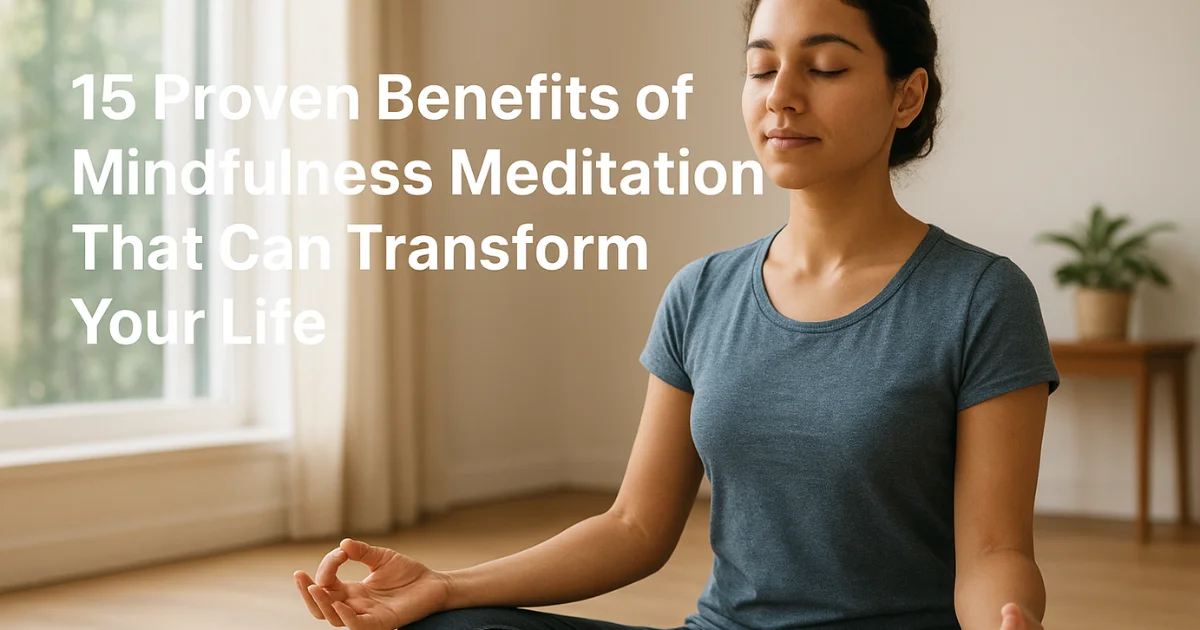A Guide to Mindfulness Meditation
Stress, worry, and diversions are now a normal part of living in our fast-paced society. More and more people are using mindfulness meditation as an effective way to improve their mental, physical, and emotional health. Mindfulness meditation has been used for hundreds of years and is supported by research. It helps people stay grounded, focused, and at peace.
Let’s look at the 15 proven advantages of mindfulness meditation and how this simple yet powerful practice may change your life.
What is meditation with mindfulness?
Being mindful Meditation is the act of being aware of the present moment without judging it. It’s about letting the mind become clear and quiet by watching ideas, feelings, and sensations as they come and go.
Mindfulness is different from typical meditation practices that may involve chanting or visualization. It focuses on being aware and accepting.
Where Mindfulness Comes From and What It Means
Buddhism has been practicing mindfulness for more than 2,500 years, so it has profound roots. Dr. Jon Kabat-Zinn created Mindfulness-Based Stress Reduction (MBSR), which is being used in non-religious programs. No matter what faith or belief system you have, these new methods make mindfulness available to everyone.
Why Mindfulness is Becoming More Popular Around the World
People all throughout the world are becoming more attentive, from CEOs in Silicon Valley to teachers and healthcare professionals. Journals like JAMA Internal Medicine have published studies that indicate mindfulness can greatly lower stress, help you sleep better, and help you control your emotions better. Mindfulness is a natural and low-cost way to deal with mental health problems that are becoming more common.
Mindfulness meditation has physical benefits, such as lowering stress and regulating cortisol levels.
Stress alleviation is one of the benefits that has been most thoroughly studied. Mindfulness lowers cortisol, which is the main hormone that causes stress in the body. This makes you feel less overwhelmed and tired.
Better Sleep Quality
Mindfulness before bed helps calm racing thoughts, which can help people fall asleep faster and get better rest.
Increasing immunity and lowering inflammation
Meditation on a regular basis boosts the immune system and lowers signs of inflammation, which makes the body better able to fight off illness.
Helping the heart and lowering blood pressure
Mindfulness helps you relax and improves your circulation, which helps keep your blood pressure normal and lowers your risk of heart disease.
Mindfulness and its mental benefits Meditation: Improving Focus and Attention
Mindfulness helps you focus and stay in the present, which is an important skill to have in today’s digital environment.
Lessening the Signs of Depression and Anxiety
In some cases of anxiety and sadness, mindfulness has been demonstrated to work just as well as medication. It helps people better control their emotions.
Building up your emotional strength
Mindfulness teaches us to respond with tranquility instead of acting on impulse. This helps us become more resilient in the face of life’s adversities.
Getting more self-aware and clear
Mindfulness helps people understand their thoughts and actions better, which leads to positive personal growth.
Mindfulness has spiritual and emotional benefits.
Making Compassion and Empathy Stronger
Being mindful makes you more compassionate and caring toward yourself and others, which strengthens emotional connections.
Making the mind-body connection stronger
Mindfulness connects mental and physical health by paying attention to feelings, breathing, and sensations.
Helping to find peace and happiness within
Mindfulness is all about finding inner peace, which helps people feel more grounded and happy.
Practical Benefits in Daily Life: Being Present to Improve Relationships
Being fully present makes it easier to talk to each other and makes relationships stronger and better.
Improving productivity and making decisions
A mind that is calm and focused makes better choices and gets more done.
Getting rid of work burnout
Mindfulness tasks at work have been shown to keep workers from getting burned out, boost morale, and get them more involved.
Simple Steps to Help You Start Mindfulness Meditation
Pay attention to how you breathe.
Don’t judge your thoughts as you look at them.
Body-scan meditation might help.
How often to work out every day
It only takes 10 to 15 minutes a day to see big changes. It’s more important to be consistent than to last a long time.
Problems that most people have and how to fix them
For beginners, it might be hard to keep their thoughts from wandering or to wait their turn. The most important thing is to gently notice distractions and go back to your breath.
Mindfulness practice is good for you in more ways than one. It makes you less stressed, more focused, and mentally strong. It’s also good for your health in general. It doesn’t matter how long you do it for; being mindful can change your health, relationships, and view on life.
Frequently Asked Questions about
How long does it take for mindfulness meditation to help?
Most people feel better and less stressed after a few weeks of regular practice.
Can mindfulness meditation take the place of therapy or medication?
It can go along with traditional treatments, but it shouldn’t take the place of competent medical guidance.
Is mindfulness meditation a religious practice?
No, it comes from Buddhism, but people do it a lot in non-religious and scientific situations.

Business Consultant | Web designer & Developer | Social media Manager | SEO | Passionate Learner, I am deeply passionate about learning and continuously improving my skills.
My interests are diverse, ranging from music and singing to computers and programming languages, digital art, AI


